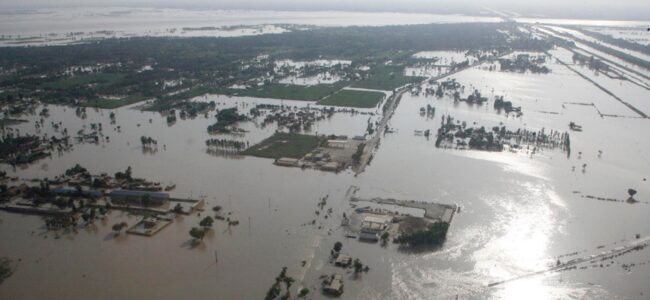The climate crisis is one of the most pressing issues of our time. The effects of global warming are being felt across the world, from rising sea levels on the East Coast of the United States to extreme weather events in Pakistan. Climate change is contributing to biodiversity loss, food insecurity and the global refugee crisis. It is a complex and multi-faceted problem fueled by fossil fuel companies and governments that refuse to regulate emissions. It’s a problem that requires urgent action.
 A view of heavy floods caused by monsoon rains in Punjab Province, near the city of Multan, Pakistan.
A view of heavy floods caused by monsoon rains in Punjab Province, near the city of Multan, Pakistan.
In the face of the immense challenges posed by climate change, it can be easy to feel a sense of doom and hopelessness.The scale of the problem can feel overwhelming, and the solutions can seem elusive.
What is Climate Optimism?
Climate Optimism is a mindset that focuses on the positive actions we can take, rather than the negative consequences of inaction. It is a belief that, by working together and taking action, we can mitigate the worst impacts of climate change and build a world that is healthier and more equitable for all. It’s about choosing a path of resilience, action and hope.
You might be thinking: “How can we be optimistic when the situation is so dire? Isn’t it just too big of a problem to solve?” It can be challenging to see a way forward in the face of such overwhelming challenges. But that’s precisely why Climate Optimism is so important.
The science is clear: we’re already experiencing the effects of climate change, and things are only going to get worse if we don’t take action. But here’s the thing: we are taking action. There are so many people and organizations out there working tirelessly to make a difference, and their efforts are making a significant impact.
Resources for Aspiring Climate Optimists
For example, the Not Too Late project by Rebecca Solnit and Thelma Young Lutunatabua provides resources and encouragement to both newcomers and veterans of the climate movement. They’ve compiled a series of essays and interviews into a corresponding book, Not Too Late: Changing the Climate Story from Despair to Possibility, which offers hope to those who might be feeling despondent or anxious about climate change.
The Climate of Possibility project by Ashley Fairbanks of the 100% campaign provides hopeful climate messaging with the goal of catalyzing action. The beautifully-designed Climate of Possibility Toolkit gives individual activists a place to reflect and map their goals. At the same time, the toolkit helps activists cultivate a practice of hope and self care, to be sure that their work is sustainable.
In many communities, young people are the ones leading the charge for climate action. The youth-led movement for climate justice is making a real difference and encouraging businesses and organizations to commit to sustainability and reducing their carbon footprint. Spend an hour on TikTok, and you’re likely to see videos from young climate activists mobilizing their peers to create change.
One of these youth climate activists, Zahra Biabani, has started a second-hand clothing rental app and published a book titled Climate Optimism: Climate Wins and Creating Systemic Change Around the World. Zahra shares examples of unique tactics used by communities in the Global South to address climate-related problems.
These are just a few examples of the inspiring work being done for a more sustainable climate future. All of these efforts, big and small, are adding up. We’re making progress, and we’re doing it together. And that’s what climate optimism is all about: recognizing that we have the power to create change, and believing that we will.
So how can you be a Climate Optimist?
Here are a few tips for actively cultivating this mindset:
1. Stay informed: Learn about the science behind climate change, the impacts it is having on the planet and people, and the solutions that are being proposed. Understanding the problem is key to finding the most successful tactics that will lead us to a solution.
2. Take action: Start by making small changes in your own life, such as reducing your carbon footprint or supporting sustainable businesses. Get involved in advocacy and activism to push for larger-scale change. We don’t have to do it all, but we can each do something to fight climate change. Don’t underestimate the power of individual action.
3. Connect with others: Join a local environmental group, attend climate marches and rallies, or participate in online communities focused on climate action. Being part of a community of people who are passionate about creating change can help you feel more hopeful and inspired. The more we connect with others, the more powerful our collective voice will be.
4. Celebrate progress: Remember to celebrate the successes of climate action. By celebrating progress, we can stay motivated and inspired to continue our work. Share positive news stories on social media, thank businesses and organizations that are making sustainability a priority, and take time to appreciate the beauty and wonder of the natural world.
5. Practice self-care: It’s important to take care of yourself as you work to make a difference. Climate activism can be emotionally exhausting, and it’s okay to take a break when you need it. Make sure to prioritize your own well-being, so you can stay in this work for the long haul.
Hope is a Powerful Force
Climate Optimism is about staying hopeful. Hope is a powerful force that can drive us forward, even in the face of seemingly insurmountable challenges. When we believe that a better future is possible, we are more likely to take the actions necessary to create it.
This perspective was contributed by Melissa McNeilly, New Tactics in Human Rights Project Manager for Digital Content.